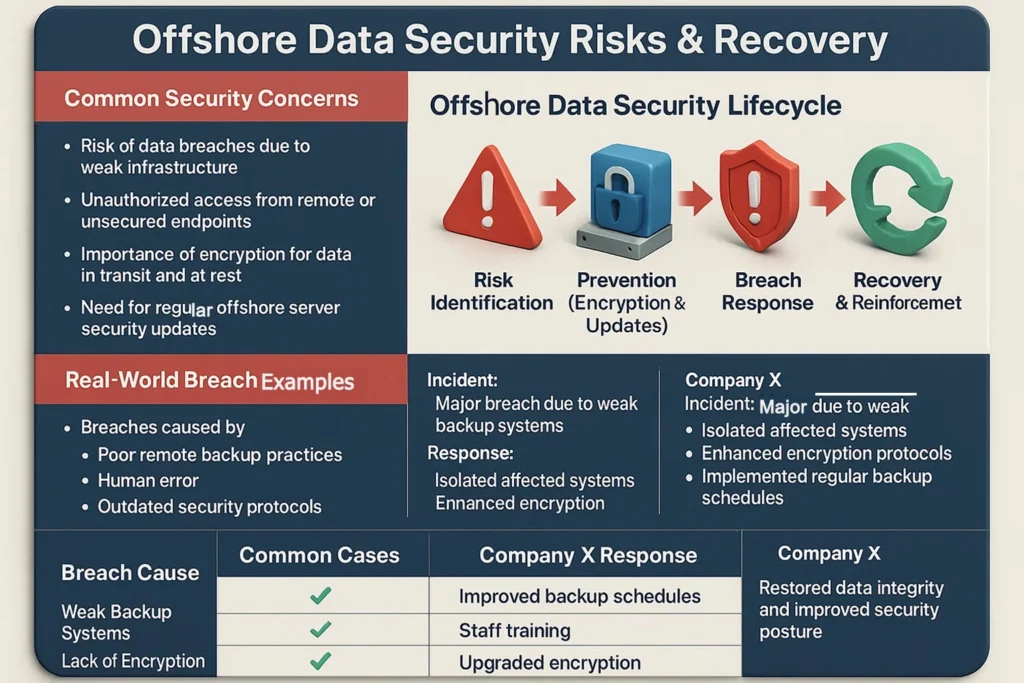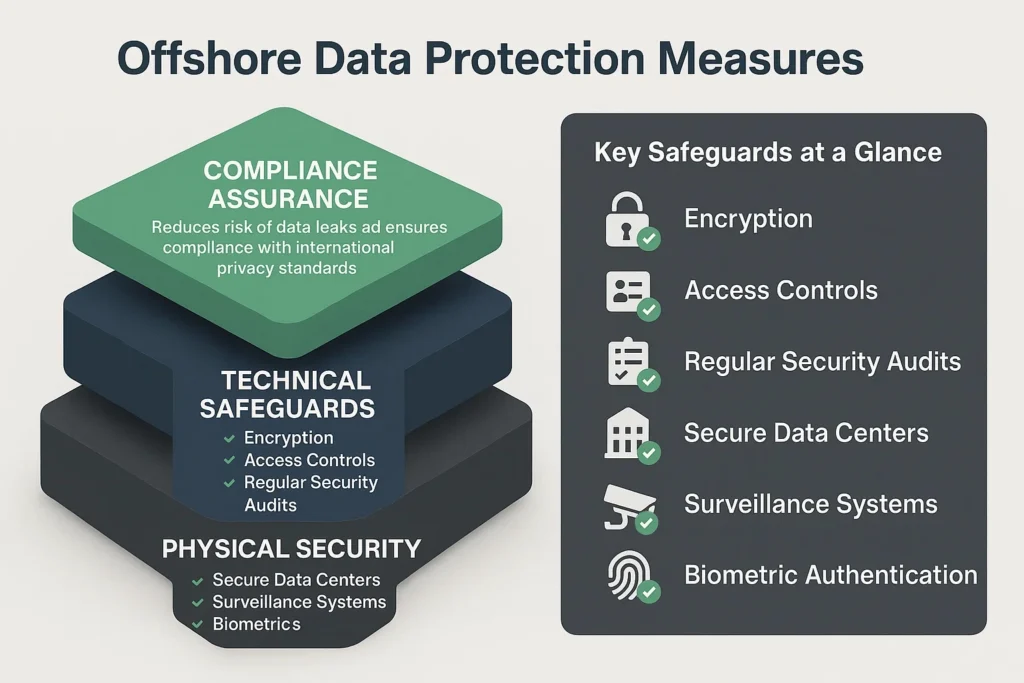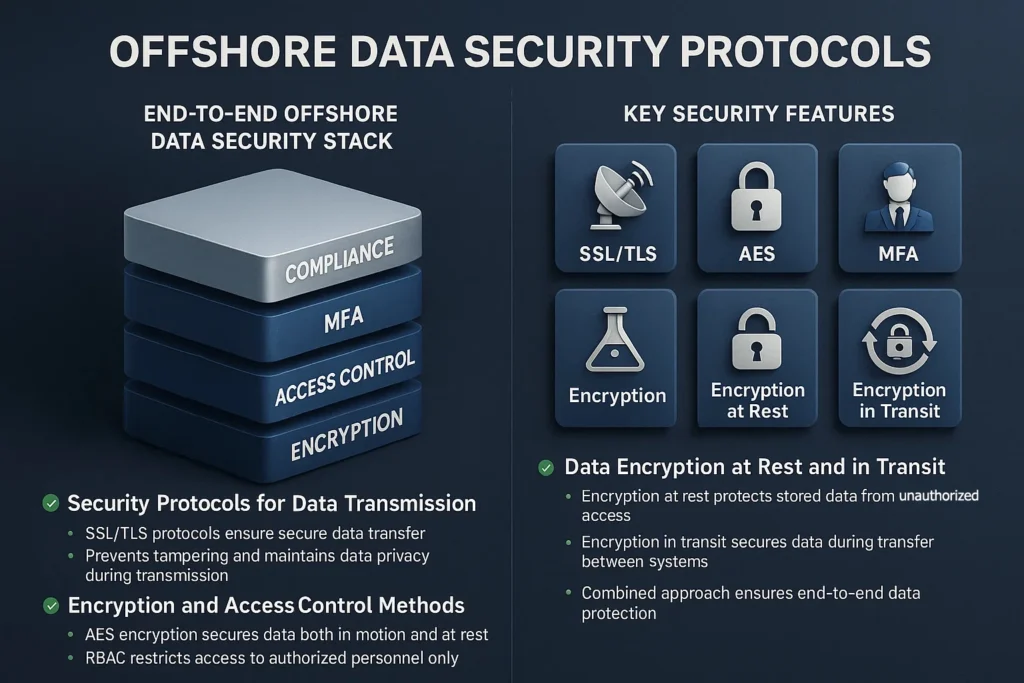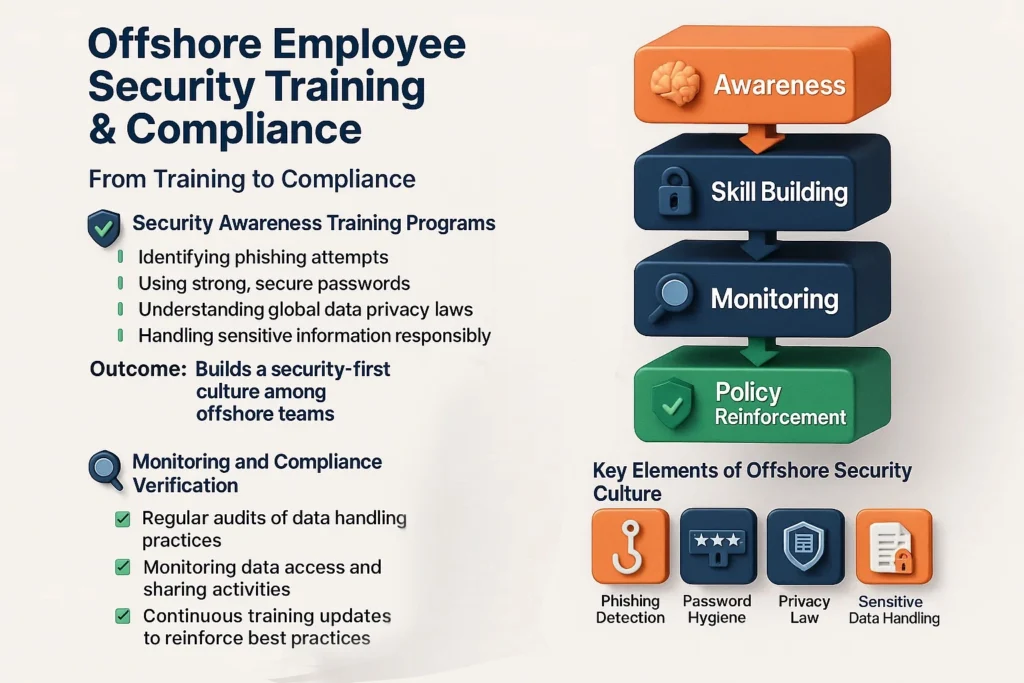Did you know a single data breach can cost a company millions? As more businesses use offshore teams for tasks like online data entry, keeping data safe is key.
Offshore teams have special challenges in keeping data safe and following rules like GDPR. They use strong data protection services and secure data storage to meet these challenges.
Learning how offshore teams manage data security and GDPR can help you make better business choices.
Offshore data services have changed a lot. This is thanks to new technology and business needs. Now, companies can use specialized skills and save money on data management.
Offshore data services have grown from simple tasks to complex ones. Today, they handle advanced tasks like Cybersecurity solutions. They also do data mining, predictive analytics, and business intelligence.
This change is thanks to better offshore data management and technology. Businesses can now outsource many data tasks. This makes them more efficient and helps with big decisions.
The need for offshore-online data entry specialists has increased. This is because of more e-commerce and digital businesses. These experts handle lots of data, keep it accurate, and ensure secure data transfer.
Using offshore data entry specialists helps businesses manage data better. It saves them money and makes them more competitive globally.

Exploring offshore data services means facing security challenges. These challenges can affect your data’s integrity and privacy.
Offshore operations come with security risks like data breaches and unauthorized access. Using data encryption services is key to safeguard your data. Also, keeping offshore server security up to date is critical to avoid vulnerabilities.
Offshore data breaches have happened, causing big problems. For instance, a breach can happen because of weak security or human mistakes. A famous case was a company’s breach due to poor remote data backup practices.
Company X, a top offshore data service, faced a big breach. They acted fast by isolating the problem and boosting security. They improved data encryption services and backup schedules.
Security Measure | Description | Benefit |
Data Encryption | Protects data in transit and at rest | Prevents unauthorized access |
Offshore Server Security | Regular updates and patches | Prevents vulnerabilities |
Remote Data Backup | Frequent backup schedules | Ensures data recovery |

Exploring offshore data environments means you need to know about GDPR compliance. The General Data Protection Regulation (GDPR) has strict rules for handling personal data. Offshore teams must follow these rules to keep data safe and comply with regulations.
GDPR compliance for international data processing has several key points. These include:
To achieve GDPR compliance offshore, you need a solid plan. Two main areas to focus on are:
Managing data subject rights is key to GDPR compliance. This means:
Finding a lawful basis for processing personal data is vital. Common bases include:
To show the key GDPR requirements and strategies for offshore compliance, here’s a table:
GDPR Requirement | Strategy for Compliance | Implementation Example |
Lawful Basis for Processing | Establish a valid lawful basis | Obtain explicit consent from data subjects or rely on contractual necessity |
Data Subject Rights Management | Implement processes for data subject rights | Develop a system to handle access requests and rectification requests efficiently |
Data Security | Implement technical and organizational measures | Use data encryption solutions and access controls to secure data |
By understanding and applying these GDPR requirements and strategies, offshore teams can meet compliance. They can also ensure secure offshore storage for sensitive data. Good remote data security measures are essential here.

Top offshore teams use both technical and physical security to keep data safe. Knowing these methods is key if you’re thinking about using offshore data services.
Technical safeguards are key for offshore data safety. They include:
With these technical steps, offshore teams can lower the chance of data leaks. They make sure international data privacy is kept.
Physical security is also vital. It includes:
A top financial company set up a detailed data protection plan for its offshore work. The plan had:
Measure | Description | Benefit |
Multi-Factor Authentication | Needs more than one way to prove who you are to get in. | Makes it harder for unauthorized people to get in. |
Data Encryption | Encrypts data when it’s moving and when it’s stored. | Keeps data safe from hackers. |
Regular Security Training | Trains staff on the latest security rules. | Less chance of mistakes that could lead to security problems. |
This example shows how offshore teams can use offshore cybersecurity solutions to guard data. It helps keep cyber security offshore strong.

When looking into offshore data handling, it’s key to know the top security steps leaders take. Securing sensitive info is a big task. It needs strong ways to send, store, and control data access.
Top companies focus on safe data sending. They use Secure Sockets Layer/Transport Layer Security (SSL/TLS) to keep data safe while it’s moving. This makes sure the info stays private and safe from tampering.
Keeping data safe with data encryption offshore is a must. Companies use Advanced Encryption Standard (AES) to lock data in place and on the move. They also use Role-Based Access Control (RBAC) to make sure only the right people can see sensitive data.
Multi-Factor Authentication (MFA) is a big part of keeping data safe. It makes users prove who they are with more than one way. This makes it much harder for hackers to get in. Using MFA helps keep offshore data privacy strong and fights off cyber threats.
Encrypting data both when it’s stored and when it’s moving is key to keeping it safe. Data encryption at rest keeps data safe from prying eyes when it’s stored. Encryption in transit keeps data safe as it moves from one place to another. This two-step approach keeps offshore data safe from start to finish.
By following these best practices, companies can keep their offshore data safe and sound. This not only boosts offshore data privacy but also builds trust with clients and others.

The success of offshore data security depends on the training and management of offshore employees. When you use offshore teams for data work, knowing how to train them is key.
Offshore employees get thorough security awareness training programs. These programs teach them how to protect data. They learn about:
This training makes sure offshore employees can keep data safe. It helps keep your operations secure.
Companies watch over offshore employees to make sure they follow data security rules. They do this through:
Company Y, a top offshore data service provider, boosted its security with a big training effort. They focused on security awareness and compliance verification. This greatly improved their security culture.
Training Component | Pre-Training Status | Post-Training Status |
Phishing Detection | 60% success rate | 95% success rate |
Data Handling Practices | 70% compliance | 98% compliance |
Security Protocols Understanding | 50% understanding | 90% understanding |
Investing in training and managing offshore employees greatly improves your data security. It ensures secure offshore data management and follows data privacy rules.

Offshore document review is a critical process. It keeps sensitive information safe and follows legal rules. When you think about outsourcing document review, knowing how to keep things confidential and legal is key.
Keeping data safe is a top goal. This means using encrypted data transmission to stop unauthorized access. Offshore teams use strong access controls. This makes sure only the right people can see or handle documents.
Offshore teams take quality very seriously. They do quality checks at every stage of document processing. They also make sure their team gets continuous training to deal with complex documents.
A top law firm cut costs by 30% by using an offshore team for document review. The team followed strict offshore data security protocols. This ensured the documents’ safety and integrity.
Offshore teams use technology and best practices to keep their data analytics processes safe. They handle huge amounts of data. It’s key to keep data integrity and follow rules like GDPR.
Offshore teams make sure their analytics are accurate and reliable. They do this through:
Keeping sensitive information safe is very important in offshore data analysis. Teams use cyber security solutions and offshore cybersecurity to protect data. They use encryption, access controls, and secure ways to send data.
In healthcare, offshore teams must follow strict rules like HIPAA. A healthcare provider outsourced its data analytics to an offshore team. This team used strong offshore it security to keep data safe and follow rules.
Data Protection Measure | Description | Industry Example |
Data Encryption | Protects data both in transit and at rest | Healthcare industry uses encryption to safeguard patient data |
Access Controls | Restricts data access to authorized personnel | Financial institutions use role-based access controls |
Regular Audits | Ensures ongoing compliance and data integrity | Regular audits in the e-commerce industry to maintain customer trust |
More businesses are choosing offshore data operations for cost savings. They ensure their data is safe and secure. This way, they can cut down on expenses without losing data protection and cybersecurity services.
Offshore data operations offer big cost savings. By moving data handling to secure offshore sites, companies save on labor and improve efficiency. These savings help them use their resources better while keeping their data safe.
Looking at in-house vs. offshore data solutions, costs vary. Here’s a table showing the main differences:
Cost Factor | In-House Solutions | Secure Offshore Solutions |
Initial Setup Costs | High | Lower |
Operational Costs | High | Lower |
Security Measures | High Maintenance | Specialized, Cost-Effective |
Starting an in-house data operation is expensive. It needs a lot of money for setup, tech, and staff. Offshore solutions, on the other hand, have ready-made setups and trained teams, saving on these costs.
Secure offshore data operations save money in the long run. They use economies of scale and specialized skills. This leads to big savings on data work while keeping data safe and following data protection regulations.
Exploring offshore data operations shows the need to balance security, compliance, and cost. Teams handling sensitive data must use strong security measures. This protects confidential data offshore.
Good offshore cloud security is key to keeping data safe. By following best practices and training employees, teams can meet GDPR standards. This keeps their data operations secure and compliant.
When looking at offshore costs, think about the total cost of ownership. This includes the expenses of setting up and keeping strong security in place. This way, businesses can save money without sacrificing security or meeting standards.
Understanding the challenges and benefits of offshore data operations helps make better decisions. With the right strategy, offshore teams can offer a secure, compliant, and affordable solution for your data needs.
Offshore teams use strong technical measures like encryption and access controls to protect data. They also train employees on security and keep facilities safe.
Offshore teams follow GDPR by managing data subject rights and ensuring legal processing. They keep detailed records and check for compliance regularly.
Common worries include data breaches and unauthorized access. Offshore teams must have strong security to avoid these issues.
They use encryption and access controls for data protection. Employees handling data are trained and authorized.
Secure offshore data operations save money on labor and infrastructure. They also scale better. This way, companies save without sacrificing security or compliance.
They follow secure document handling and quality control. They also keep detailed records of document processing.
Training is key for offshore employees. It teaches them about data security and threats. Regular training helps them play a big role in keeping data safe.
They ensure data quality and validate sources. Data analysis follows rules and policies, keeping data safe and reliable.
Join thousands of businesses leveraging offshore staffing to scale their operations globally
Expand effortlessly with My Offshore Employees - access top 1% offshore talent starting at just $3/hr or $600/month per FTE. No hidden fees, no compromises on quality. Your offshore employees work exclusively for you - ensuring focus, transparency, and real-time visibility into your projects. We combine smart automation and proven industry experience to deliver higher productivity, fewer errors, and tailor-made solutions for your business growth.

© 2022-Present MyOffshoreEmployees.com – A brand of iWebGenics Pvt. Ltd. (India)